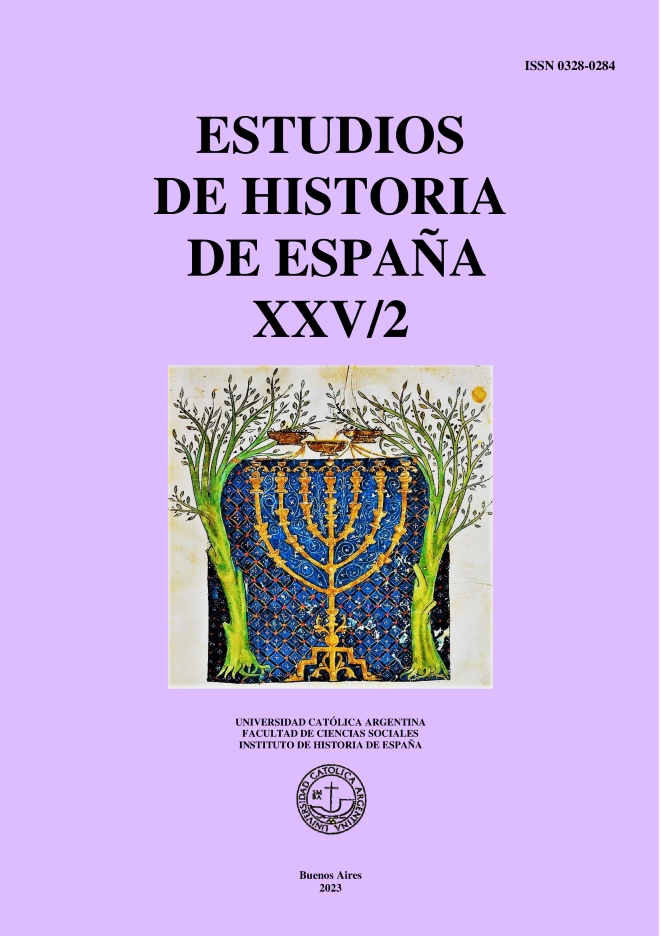Cristianos esclavizados y propietarios judíos en la hagiografía, la teología y el derecho visigodos
DOI:
https://doi.org/10.46553/EHE.25.2.2023.p142-165Palabras clave:
Relaciones judeo-cristianas, esclavitud, Ley visigoda, hagiografía, adversus IudaeosResumen
La ibérica Passio Mantii es un raro relato de martirio tardoantiguo en el que el protagonista, Mantius, es presentado como un esclavo cristiano en manos de propietarios judíos, quienes lo hostigan hasta la muerte por no convertirse al judaísmo. Este inusual texto hagiográfico tiene puntos de contacto con la extensa legislación producida en la Iberia visigoda sobre la cuestión de la propiedad judía de los esclavos cristianos. Analizar estas fuentes y explorar su trasfondo teológico nos permite, en primer lugar, comprender mejor los cambios que los legisladores visigodos hicieron a una larga tradición legal de prohibir tanto la conversión como la propiedad de esclavos cristianos por parte de los judíos. Pero también nos permite, por otra parte, ir más allá de la suposición de que las fuentes reflejan una práctica social activa y preguntarnos si en realidad el interés en la temática en torno a judíos ejerciendo poder sobre cristianos fue parte del desarrollo de un discurso sobre el peligro judío que fue, a su vez, fundamental para la construcción de más nítidas identidades religiosas en el siglo VII.
Descargas
Citas
GREGORY THE GREAT, The Letters of Gregory the Great, translated by John R. C. Martyn. Vol. 40. Mediaeval Sources in Translation, Toronto, University of Toronto Press, 2004.
ISIDORE OF SEVILLE, De fide catholica ex veteri et novo testamento contra Judaeos, Patrologia Latina, 83, 1862, cols. 449-538.
LINDER, Amnon, The Jews in Roman Imperial Legislation, Detroit, Wayne State Univ. Press, 1987.
LINDER, Amnon, The Jews in the Legal Sources of the Early Middle Ages, Detroit/ Jerusalem, Wayne State University Press/Israel Academy of Sciences and Humanities, 1997.
MARTÍNEZ DÍEZ, Gonzalo and Felix RODRÍGUEZ (eds), La Colección Canónica Hispana V. Concilios Hispanos: Segunda Parte, Madrid, CSIC Instituto Enrique Flórez, 1992.
YARZA URQUIOLA, Valeriano (ed.), Passionarium Hispanicum, Corpus Christianorum Series Latina 171-171A, Turnhout, Brepols, 2020.
ZEUMER, Karl (ed.), Leges Visigothorum, Monumenta Germaniae Historica, Leges nationum Germanicarum, 1, Hannover, Hahn, 1902.
ABUSCH, Ra’anan, “‘Negotiating Difference: Genital Mutilation in Roman Slave Law and the History of the Bar Kokhna Revolt,’” in SCHÄFER, Peter, The Bar Kokhbah War Reconsidered: New Perspectives on the Second Jewish Revolt against Rome, Tübingen, Mohr Siebeck, 2003, 71-91.
ALBERT, Bat-Sheva, “Les communautés juives vues à travers la législation royale et ecclésiastique visigothique et franque,” in TOLAN, John; DE LANGE, Nicholas; FOSCHIA, Laurence; NEMO-PEKELMAN, Capucine, Jews in Early Christian Law: Byzantium and the Latin West, 6th–11th Centuries, Turnhout, Brepols, 2014, 179-93.
BACHRACH, Bernard S., Early Medieval Jewish Policy in Western Europe, Minneapolis, MN, University of Minnesota Press, 1977.
BACHRACH, Bernard S., “A Reassessment of Visigothic Jewish Policy, 589-711,” The American Historical Review 78, 1973, 11–34.
BENVÉNISTE, Henriette-Rika, “On the Language of Conversion: Visigothic Spain Revisited”, HISTOREIN, 6, 2006, 72-87.
BONNASSIE, Pierre, From Slavery to Feudalism in South-Western Europe, trans. Jean Birrell, Cambridge, Cambridge University Press, 1991.
BONNASSIE, Pierre, “Survie et déclin du régime esclavagiste dans l’Occident du haut moyen âge (IVe-XIe siècle)”, Cahiers de Civilisation Médiévale, 28, 1985, 307-43.
BRONISCH, Alexander Pierre, Die Judengesetzgebung im Katholischen Westgotenreich von Toledo, Hannover, Hahnsche Buchhandlung, 2005.
BUCHBERGER, Erica, “Gothic Identity and the ‘Othering’ of Jews in Seventh-Century Spain”, in FOX, Yaniv and BUCHBERGER, Erica, Inclusion and Exclusion in Mediterranean Christianities, 400-800, Turnhout, Brepols, 2019, 199-216.
CASTILLO MALDONADO, Pedro, Los mártires hispanorromanos y su culto en la Hispania de la Antigüedad Tardía, Granada, Universidad de Granada, 1999.
CASTILLO MALDONADO, Pedro, “Judíos, conversos y relapsos en la hagiografía narrativa tardoantigua hispana”, Studia Historica: Historia Antigua, 24, 2006, 185-203.
CHERNIN, Liubov, “Visigothic Jewish Converts: A Life in Between”, Visigothic Symposium, 3, 2019, 1-18.
CLAUDE, Dietrich, Adel, Kirche und Königtum im Westgotenreich, Sigmarigen Thorbecke, 1971.
CLAUDE, Dietrich, “Freedmen in the Visigothic Kingdom”, Visigothic Spain: New Approaches, 1980, 159-88.
COHEN, Jeremy, Living Letters of the Law: Ideas of the Jew in Medieval Christianity, Berkeley, University of California Press, 1999.
COLOMINA TORNER, Jaime, “El antijudaísmo hispanovisigodo y sus posibles ecos en los textos litúrgicos e ildefonsinos”, in DEL VALLE RODRÍGUEZ, Carlos, La Controversia judeocristiana en España: (desde los orígenes hasta el siglo XIII): Homenaje a Domingo Muñoz León, Madrid, Instituto de Lenguas y Culturas del Mediterráneo y Oriente Próximo -ILC, 1998, 171-190.
CÓRCOLES OLAITZ, Edorta, “The Manumission of Slaves in the View of the ‘Formulae Visigothicae’”, Veleia, 23, 2006, 339-49.
DAVIES, Wendy, “On Servile Status in the Early Middle Ages”, in BUSH, Michael, Slavery and Serfdom, London, Longman, 1996, 232-38.
DÍAZ Y DÍAZ, Manuel Cecilio, “La ‘Passio Mantii’ (BHL 5219)”, Analecta Bollandiana, 100, 1982, 327-39.
DÍEZ MERINO, Luis, “San Isidoro de Sevilla y la polémica judeocristiana”, in DEL VALLE RODRÍGUEZ, Carlos, La Controversia judeocristiana en España: (desde los orígenes hasta el siglo XIII): Homenaje a Domingo Muñoz León, Madrid, Instituto de Lenguas y Culturas del Mediterráneo y Oriente Próximo -ILC, 1998, 77-110.
DREWS, Wolfram, “Jews as Pagans? Polemic Definitions of Identity in Visigothic Spain”, Early Medieval Europe, 11, 2002, 189-207.
DREWS, Wolfram, The Unknown Neighbour. The Jew in the Thought of Isidore of Seville, Leiden, Brill, 2006.
ESDERS, Stefan, “‘Because their Patron Never Dies’: Ecclesiastical Freedmen, Socio-Religious Interaction, and Group Formation under the Aegis of ‘Church Property’ in the Early Medieval West (Sixth to Eleventh Centuries)”, Early Medieval Europe, 29, 2021, 555-85.
FERNÁNDEZ CATÓN, José María, San Mancio: Culto, Leyenda y Reliquias. Ensayo de Crítica Hagiográfica, León, Centro de Estudios e Investigación “‘San Isidoro’”, 1983.
FONTAINE, Jacques, Isidore de Séville: Genèse et originalité de la culture hispanique au temps des Wisigoths, Turnhout, Brepols, 2000.
FREIDENREICH, David M., “Jews, Pagans, and Heretics in Early Medieval Canon Law”, in TOLAN, John; DE LANGE, Nicholas; FOSCHIA, Laurence; NEMO-PEKELMAN, Capucine, Jews in Early Christian Law, Turnhout, Brepols, 2014, 73-94.
GARCÍA MORENO, Luis A., “Expectativas milenaristas y escatológicas en la España tardoantigua (siglos V-VII)”, Arqueología, paleontología y etnografía, 4, 1998, 247-58.
GARCÍA MORENO, Luis A., “From Coloni to Servi: A History of the Peasantry in Visigothic Spain”, Klio, 83, 2001, 198-212.
GARCÍA MORENO, Luis A., Los judíos de la España antigua: del primer encuentro al primer repudio, Madrid, Ediciones Rialp, 2005.
GARCÍA MORENO, Luis A., “Judíos y mártires Hispano-Cristianos”, Boletín de la Real Academia de la Historia, 210, 2013, 377-403.
GIL FERNÁNDEZ, Juan, “Judíos y cristianos en la Hispania del siglo VII”, Hispania sacra, 30, 1977, 9-110.
GLANCY, Jennifer A., “‘To Serve Them All the More’: Christian Slaveholders and Christian Slaves in Antiquity”, in FYNN-PAUL, Jeff and PARGAS, Damian Alan, Slaving Zones, Leiden, Brill, 2018, 23-49.
GONZÁLEZ SALINERO, Raúl, “Los judíos y la gran propiedad en la Hispania tardo antigua: el reflejo de una realidad en la Passio Manti”, Gerión, 16, 1998, 437-437.
GONZÁLEZ SALINERO, Raúl, Las conversiones forzosas de los judíos en el reino visigodo, Rome, CSIC and Escuela española de Historia y Arqueología en Roma, 2000.
GONZÁLEZ SALINERO, Raúl, “Judíos y arrianos: el mito de un acercamiento inexistente”, Sefarad, 64, 2004, 27-74.
GONZÁLEZ SALINERO, Raúl, “Manos manchadas de sangre: los orígenes cristianos del mito antijudío del crimen ritual”, Collectanea Christiana Orientalia, 10, 2013, 65-82.
GONZÁLEZ SALINERO, Raúl, “Perfiles de un debate sobre la Passio Mantii”, Hispania Sacra, 70, 2018, 185-210.
GONZÁLEZ SALINERO, Raúl, “The Motives behind Anti-Jewish Repression under the Visgothic Kingdom: Political or Religious?”, in ECHEVARRÍA ARSUAGA, Ana, and WELTECKE, Dorothea, Religious Plurality and Interreligious Contacts in the Middle Ages, Wolfenbüttel, Herzog August Bibliothek, 2020, 31-43.
GÖRRES, Franz, “Rekkared Der Katholische Und Das Judentum”, Zeitschrift Für Wissenschaftliche Theologie, 40, 1897, 284-96.
GUERREIRO, Rosa, “La imagen del judío en los textos hagiográficos y patrísticos: siglos V al VIII”, Espacio Tiempo y Forma. Serie II, Historia Antigua, 6, 1993.
HEN, Yitzhak, “A Visigothic King in Search of an Identity - Sisebutus Gothorum Gloriosissimus Princeps”, in CORRADINI, Richard, Ego Trouble. Authors and Their Identities in the Early Middle Ages, Vienna, Verlag der Österreichischen Akademie der Wissenschaften, 2010, 89-100.
HERNÁNDEZ MARTÍN, Ramón, “El problema de los judíos en los PP. Visigodos”, in XXVII Semana Española de Teología, 1970, 99-120.
HEZSER, Catherine, Jewish Slavery in Antiquity, Oxford, Oxford University Press, 2005.
JUSTER, Jean, “The Legal Condition of the Jews under the Visigothic Kings”, Parts I-III, Israel
Law Review, 11, 1976, 259-87.
LAHAM COHEN, Rodrigo, “El subordinado que subordina. Poseedores judíos de esclavos cristianos en el Registrum epistolarum de Gregorio Magno”, Gerión, 34, 2016, 325-49.
LINDER, Amnon, “Christlich-Jüdische Konfrontation Im Kirchlichen Frühmittelalter”, in HEINZGÜNTHER, Frohnes, Kirchengeschichte als Missionsgeschichte, Munich, Kaiser Verlag, 1978, 397-441.
LOTTER, Friedrich, “Totale Finsternis über ‘Dunklen Jahrhunderten’: zum Methodenverständnis von Michael Toch und seinen Folgen”, Aschkenas, 11, 2001, 215-31.
MAKUJA, D. O., “Gregory the Great, Roman Law and the Jews: Seeking ‘True’ Conversions”, Sacris Erudiri, 48, 2009, 35-74.
MARTIN, Céline and NÉMO-PEKELMAN, Capucine, “Les Juifs et la Cité. Pour une clarification du statut personnel des Juifs de l’Antiquité Tardive à la fin du royaume de Tolède (IVe-VIIe Siècles)”, Antiquité Tardive, 16, 2008, 223-46.
MARTIN, Céline and NÉMO-PEKELMAN, Capucine, “La degradación cívica de los Judíos libres en el Reino Visigodo de Toledo”, in GONZÁLEZ SALINERO, Raúl, Marginados sociales y religiosos en la Hispania Tardorromana y Visigoda, Madrid, Signifer Libros, 2013, 221-41.
MARTIN, Céline and NÉMO-PEKELMAN, Capucine, “Statut des Juifs, statut de libre dans l’Occident du Haut Moyen Âge : L’exemple ibérique”, in TOLAN, John; DE LANGE, Nicholas; FOSCHIA, Laurence; NEMO-PEKELMAN, Capucine, Jews in Early Christian Law. Byzantium and the Latin West, 6th-11th Centuries, Turnhout, Brepols, 2014, 55-71.
MARTIN, Céline and NÉMO-PEKELMAN, Capucine, “Ervig and Capital Penalties: The Way of Exile”, in MARTIN, Céline and DELL’ELICINE, Eleonora, Framing Power in Visigothic Society. Discourses, Devices, and Artifacts, Amsterdam, Amsterdam University Press, 2020, 133-58.
MATHISEN, Ralph W., “The Citizenship and Legal Status of Jews in Roman Law during Late Antiquity (ca. 300-540 CE)”, in TOLAN, John; DE LANGE, Nicholas; FOSCHIA, Laurence; NEMO-PEKELMAN, Capucine, Jews in Early Christian Law. Byzantium and the Latin West, 6th-11th Centuries, Turnhout, Brepols, 2014, 35-54.
NÉMO-PEKELMAN, Capucine, “Divine Justice and Freedom: On Canon 57 of the Fourth Council of Toledo (633)”, Visigothic Symposium, 1, 2017, 150-68.
NÉMO-PEKELMAN, Capucine, and FOSCHIA, Laurent, “Introduction : Un aperçu des sources juridiques latines et grecques relatives aux Juifs du VIe au XIe siècle”, in TOLAN, John; DE LANGE, Nicholas; FOSCHIA, Laurence; NEMO-PEKELMAN, Capucine, Jews in Early Christian Law: Byzantium and the Latin West, 6th–11th Centuries, Turnhout, Brepols, 2014, 7-32.
RABELLO, Alfredo Mordechai, “The Legal Situation of the Jews in Visigothic Arian Spain: Alaric the Second and His Roman Law of the Visigoths or Breviarium Alaricianum”, Studi Vittore Colorni, 2004, 73-101.
RIESCO CHUECA, Pilar (ed.), Pasionario hispánico, Sevilla, Universidad de Sevilla Secretariado de Publicaciones, 1995.
RIO, Alice, Slavery After Rome, 500-1100, Oxford, Oxford University Press, 2017.
ROTH, Ulrike, “Slavery and the Church in Visigothic Spain: The Donation and Will of Vincent of Huesca”, Antiquité Tardive, 24, 2016, 433-52.
SAPIR ABULAFIA, Anna, Christian-Jewish Relations, 1000-1300: Jews in the Service of Medieval Christendom, London-New York, Routledge, Taylor & Francis Group, 2014.
SAYAS ABENGOCHEA, Juan José, “Cuestiones controvertidas acerca de los Judios en la Historia antigua Peninsular”, Espacio, Tiempo y Forma, Serie II 6, 1993, 479-527.
SERFASS, Adam, “Slavery and Pope Gregory the Great”, Journal of Early Christian Studies, 14, 2006, 77-103.
STOCKING, Rachel, “Early Medieval Christian Identity and Anti‐Judaism: The Case of the Visigothic Kingdom”, Religion Compass, 2, 2008, 642-58.
STOCKING, Rachel, “Forced Converts, ‘Crypto-Judaism,’ and Children: Religious Identification in Visigothic Spain”, in TOLAN, John; DE LANGE, Nicholas; FOSCHIA, Laurence; NEMO-PEKELMAN, Capucine, Jews in Early Christian Law. Byzantium and the Latin West, 6th-11th Centuries, Turnhout, Brepols, 2014, 243-66.
SUTHERLAND, Samuel S., “The Study of Slavery in the Early and Central Middle Ages: Old Problems and New Approaches”, History Compass, 18, 11, 2020.
TOCH, Michael, “Mehr Licht: Eine Entgegnung Zu Friedrich Lotter”, Aschkenas, 11, 2001, 465-87.
TOCH, Michael, “The Jews in Europe 500-1050”, in The New Cambridge Medieval History 1, Cambridge, Cambridge University Press, 2005, 547-70.
TOCH, Michael, The Economic History of European Jews: Late Antiquity and Early Middle Ages, Leiden, Brill, 2012.
VIVES, José, Concilios visigóticos e hispano-romanos, Barcelona-Madrid, CSIC – Instituto Enrique Flórez, 1963.
WALTER, Sabina, “Conflicting Narratives in Late Antique Law Concerning Jews”, in FAFINSKI Mateusz, The Past Through Narratology: New Approaches to Late Antiquity and the Early inMiddle Ages, Heidelberg, Heidelberg University Publishing, 2022, 93-106.
WOOD, Jamie, The Politics of Identity in Visigothic Spain: Religion and Power in the Histories of Isidore of Seville, Leiden, Brill, 2012.
WOOD, Jamie, “A Family Affair: Leander, Isidore and the Legacy of Gregory the Great in Spain”, in FEAR, Andrew and WOOD, Jamie, Isidore of Seville and his reception in the early Middle Ages: transmitting and transforming knowledge, Amsterdam, Amsterdam University Press, 2016, 31-56.
Publicado
Cómo citar
Número
Sección
Licencia
Derechos de autor 2023 Dra. Kati Ihnat

Esta obra está bajo una licencia internacional Creative Commons Atribución-NoComercial-CompartirIgual 4.0.



































